Video Cast Webinar Briefing of 5 March 2020
Helping You Thrive in the World's ONLY Vital, Scarce and Recession-Proof Market
In this, now monthly, live webinar CEO Riggs Eckelberry and co-panelist COO Tom Marchesello discuss the COVID-19 virus impact on business worldwide, how it is transmitted and what this has to do with clean water and OriginClear's high power Advanced Oxidation™ technology. They also cover major emerging trends in the water industry and how OriginClear's Modular Water Systems™ have positioned the company right in the center of the decentralized water trend.
Transcript from recording
Introduction
Riggs: Hello everyone. Riggs Eckelberry here. I actually had planned to no longer have this virtual background, and have this really cool smart board, but we are still setting up the studio, so bear with me. I won't have that ability to switch the lines and so forth, but it will happen, and we will have really cool production values in the future. Meanwhile, we do have an excellent presentation for you, and I thank you for joining us. Tom Marchesello will be joining us, he's our co-panelist. But in the meantime, let's get started.
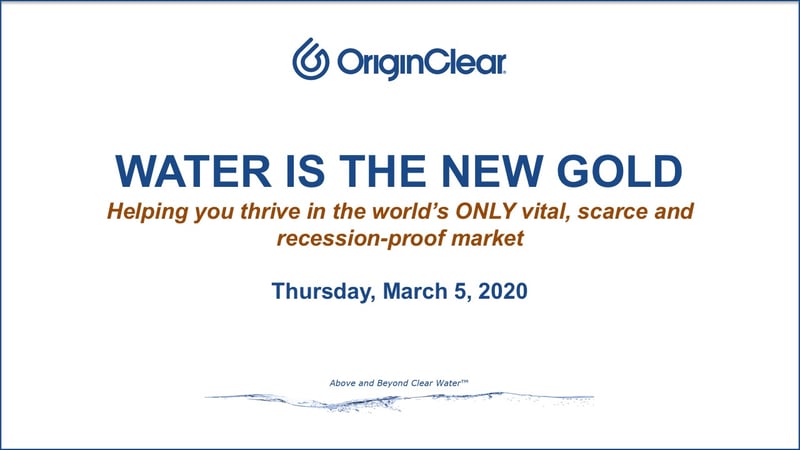
All right, so here we are once again on Thursday March fifth. This is the first Thursday of the month, and we are of course talking about Water Is The New Gold, “Helping You Thrive in the World's Only Vital, Scarce and Recession-Proof Market.”
Safe Harbor Statement
As usual, we have the Safe Harbor statement, where we have to say that these things might or might not happen.
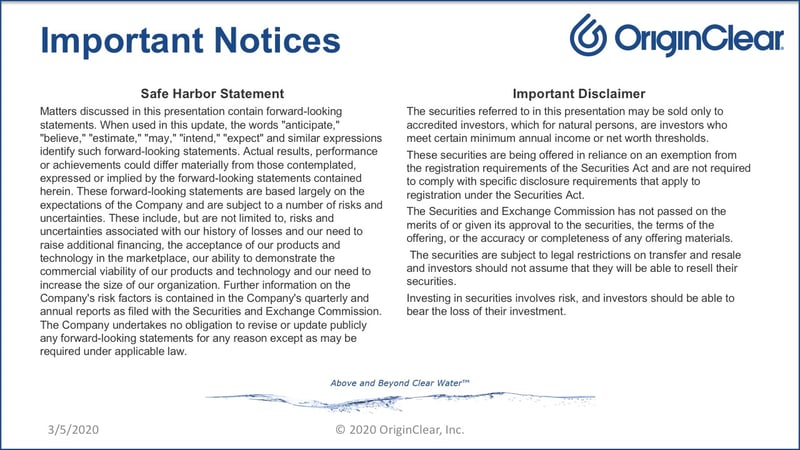
That is the standard thing we do. Also I'll be discussing an investment offering, and there is a disclaimer on the right-hand side which you can read at further leisure, when you see the transcript later on.
We have a live briefing schedule, and there is a video presentation like this on the first Thursday, and we summarize what's been happening, what's in store, what's going on. What's going on in water, what's going on in the world. Then also, of course, you will be able to see a replay afterwards, and there is also a transcript on the website you can read. “What the heck was that word he used?” Well, you'll be able to do it. Okay, so outside of that slot, we have our weekly audio briefings, and those are about the interim, it's more intimate. The updates basically, and the cool developments, breaking news and so on.
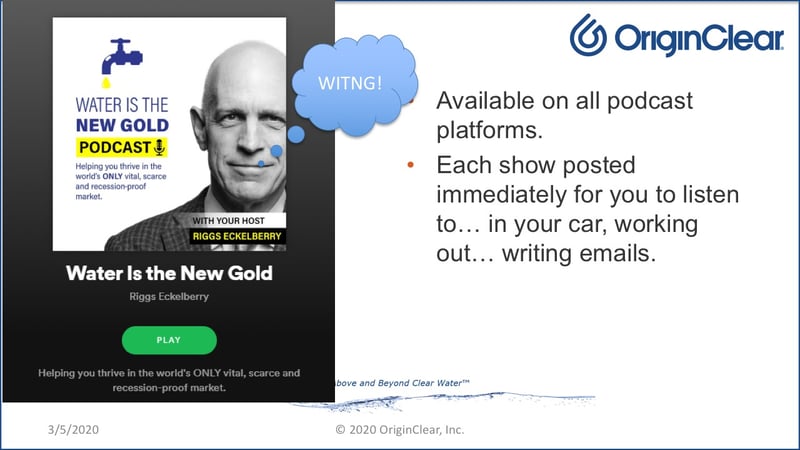
Water Is The New Gold Podcast
This is available also on this podcast that we have, which is called Water Is The New Gold, WITNG, as we call it. It is available on all podcast platforms, and each show is posted immediately for you to listen to in your car, working out, writing emails, et cetera. So I believe that Tom is joining us now. There he is. Tom!
Tom: Hey, I finally popped in.
Riggs: Fantastic, yes. There was a little hiccup, but I'm glad you joined us. I'm just basically launching the whole thing, and talking about the podcast where these shows are posted, and they're a very useful way to listen to shows that you might have missed.
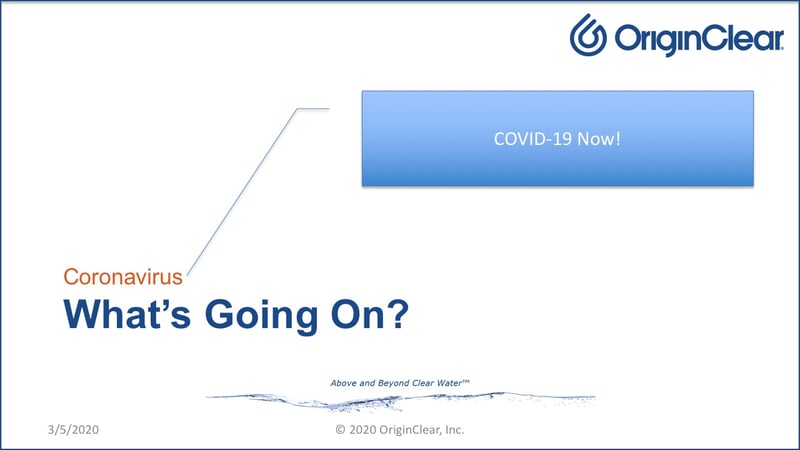
Coronavirus COVID-19
Coronavirus, now called COVID-19, that is the official word. What's going on, what's happening? I'm going to say there's so much noise about this, it's kind of disconcerting, but nevertheless, it's a reality in this marketplace, that's for sure.
Tom: It's pretty scary actually, I'll be honest with you. Do you realize in the town I'm living in, the hospital literally five miles up the street has two cases of it, and it's actually one of the nurses that got it. So, they quarantined the entire medical staff, all the doctors and nurses she worked with right there for the next 14 days, they're all totally messed up.
Riggs: Yeah, apparently you'd be very smart to have 14 days worth of non-perishables in your home, because if it comes into your neighborhood, you might just be spending two weeks in your home, which is good except that we occasionally like to get out and get some produce, right?
Tom: Which you know people are going to just go, “Oh yeah, Coronavirus, I'm just going to drive to Publics anyway. I had to eat, sorry I made 100 people sick.”
Riggs: Yeah, I know. I was at Home Depo today, and some guy coughs, I go – “Oh cripes!” Anyway, just don't go to Home Depo, right?
Tom: Absolutely.
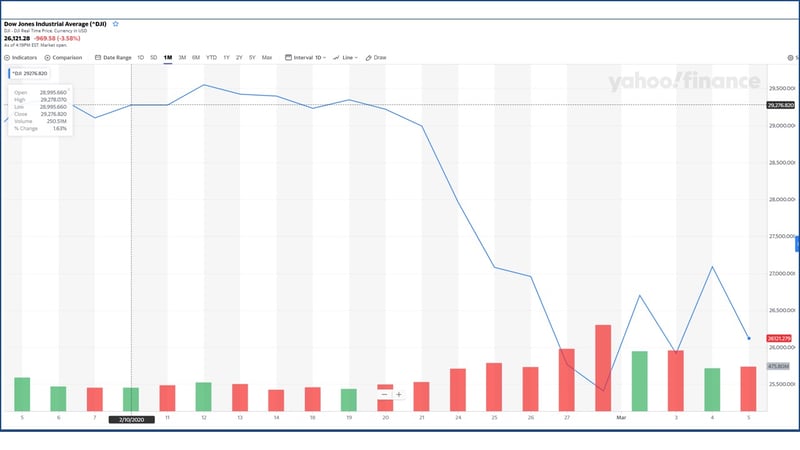
What’s Going On?
Riggs: All right, so what is going on anyway? Obviously, we have a stock market that has gone bonkers here. This is the month. It was going along nicely, but you notice it was not going up, it was kind of teetering over. A lot of the indicators were that it was headed for recession anyway, and then of course with the news about the shutdown of China around the 20th of February, people realized just how bad it was, and things crashed. We've had a steady recovery since then.
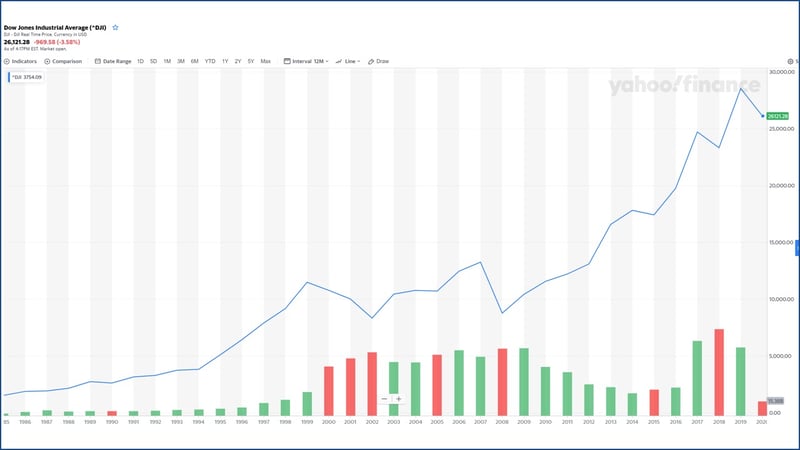
Long Term Trends
Now I'm not a stock market analyst, but I do want to show you another thing here. Here is the long-term trend, and hopefully I can move this thumbnail video around so you guys can see. But in the scheme of things, this is since 1986, even the 2008 crash was part of an overall rise. So, it's important to not get completely overexerted about it. It actually could be a lot worse. More importantly, there's a lot of other things to think about in the world.
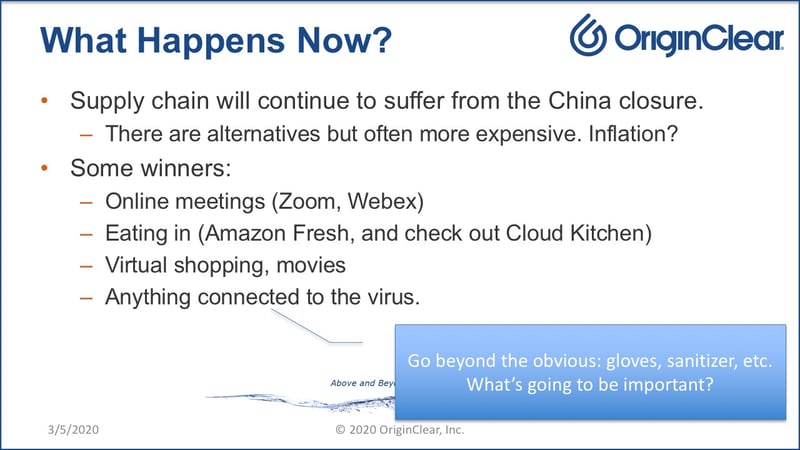
Supply Chain
For example, supply chain. What's going to happen with our supply chain? Well China was closed for about a month. They are still very closed. My brother, for example, had to source some parts out of Europe instead of China at three times the cost. There you have a problem with sourcing products, which is going to result in inflation. Another friend of mine has a protein powder. He paid everybody in China for all the packaging materials, and then he had to pay it all over again to Malaysia and Vietnam to get the alternatives, so now he paid twice.
So that's going to be tough, but there are enough alternatives out there that putting cost issues aside, it is available, and of course I think it's going to be very positive for US manufacturing in general. There's going to be a retrenchment towards your own country, if you want to get things done in the future. Some winners, obviously online meetings, what we're doing right now. We wouldn't be doing this in a hall. There's a site called What's Canceled Now, I think. It shows everything that's been canceled, which is pretty much everything. So the online meetings, in fact Cisco Webex just said they would hand out free licenses to anybody who needed it, so that they get through this, so that's kind of cool.
Ordering In
Eating in, you'll be ordering from people like Amazon Fresh. Cloud Kitchen's kind of cool. It's started by the founder of Uber, and it basically replicates a restaurant everywhere. Let's say there's a restaurant downtown L.A., now this restaurant is being replicated in other parts of Los Angeles, maybe other countries. You have let's say 40 seats in a small restaurant in downtown, well now Cloud Kitchen will put that same restaurant all over the Valley, South Bay, Orange County, and deliver. Only for delivery, it's no seats. So, it basically explodes the whole four walls of a restaurant, and it's going to be very useful for this new time when people will think twice about traveling. Virtual shopping, obviously. Going to the movies, it's going to be virtual. People going to a movie house right now, and I heard that the new Bond has been pushed back to November. So, theater movies are in trouble, but Netflix, Amazon do just fine.
Anything connected to the virus, now this is interesting. We've heard all kinds of things about 20 million, 30 million gloves being ordered, and this and that, and all this crazy stuff. All the 3M gloves are out of stock in the US, for example. That's the obvious. Purell sanitizer, okay. But beyond that, what's going to be important?
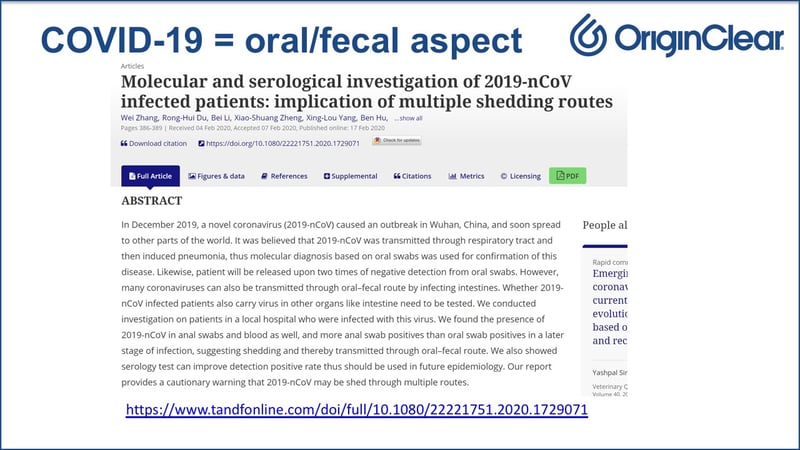
COVID-19 Transmission
This is where we get into interesting questions. COVID-19 has an oral, fecal aspect, meaning that because people don't wash their hands, this and that, whatever, the actual transmission is through the feces. You can see that it says right here, “We found the presence of what was called at the time, 2019 nCoV in anal swabs and blood. It's being transmitted through the oral fecal route.”
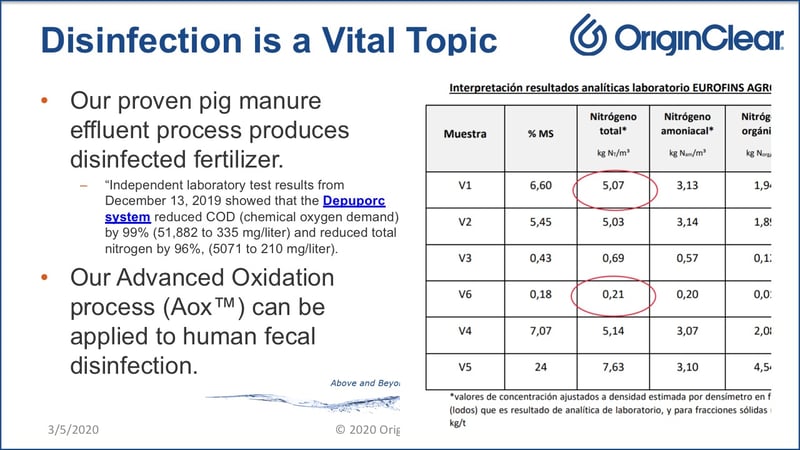
Water & Disinfection
So that is really very, very important because it brings to mind the subject of water, right? Disinfection. Light alone, there was a WHO [World Health Organization] myths site where by the way, you standing under a UV lamp is not going to keep you safe. What it's going to take for water and for everything else to kill the virus is something very powerful, such as what we had with this pig manure process, which took the five grams per liter down to .21 grams, a 96% reduction in nitrogen, as you can see. And that is 10 times below what is required by the Royal Decree of Spain of 2000. And we can apply that, obviously, if we can apply it to create disinfected fertilizer, we can also apply it to human fecal disinfection. I hate to say it like this, but it is what it is.
When you read the article, because you were sharing articles with me, I forgot the one you messaged me without even telling me what you were thinking. It just says "Fecal matter" and I'm like, Riggs. You know? I'm kind of laughing, because there's really no great word for it. Our whole industry is stuck with these really crazy words like effluent, you know it's a really polite word for saying poop, right?
Blackwater
Riggs: Black water.
Tom: Black water, right. And then we have sanitary sewage. It's kind of an oxymoron, sanitary but it's sewage. You know it's strange. So, it's kind of goofy when we're talking about this stuff, but it's important because in the end of the day, you're telling people exactly where is the virus, and it's right there, which also means we have obviously, we know what to do, so it's good, you know, to hear what you've gathered.
Riggs: We do know what to do. Advanced Oxidation™ generates a huge amount of hydroxyl radical, which is weird symbol OH, and what that weird symbol means is highly unstable. It combines with carbon at the slightest provocation, which means that it sucks away any contamination, and that includes spores, viruses, you name it. It is by far the most effective disinfectant. And so we're going to be exploring further this AOx application to human fecal disinfection.
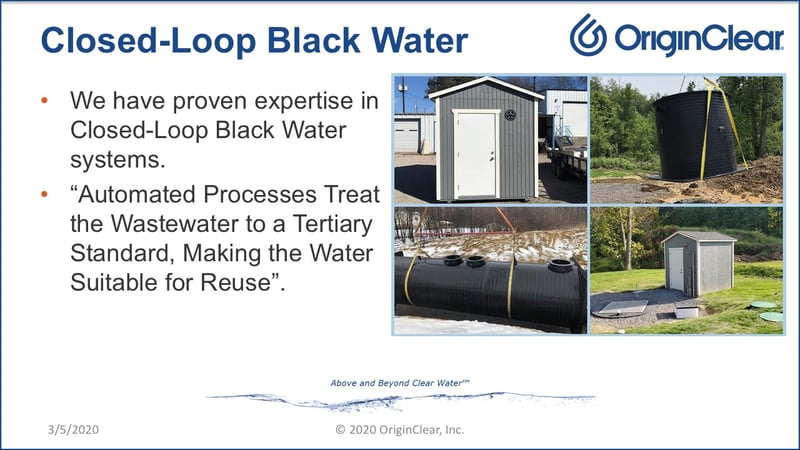
In fact, we've done that. We have published this cool case study of closed-loop black water. Black water is the cool word for poop. You can see how all this set up here was put underground, and it completely operates kind of like 50s movies where you went down 12 levels to get to the nuclear core, right? It's kind of this, 60s movies call it. Anyway, the automated process is treat the waste water to a tertiary standard. Tertiary means it's removed the nitrates, that's the final stage of water treatment, not necessarily potable in this case.
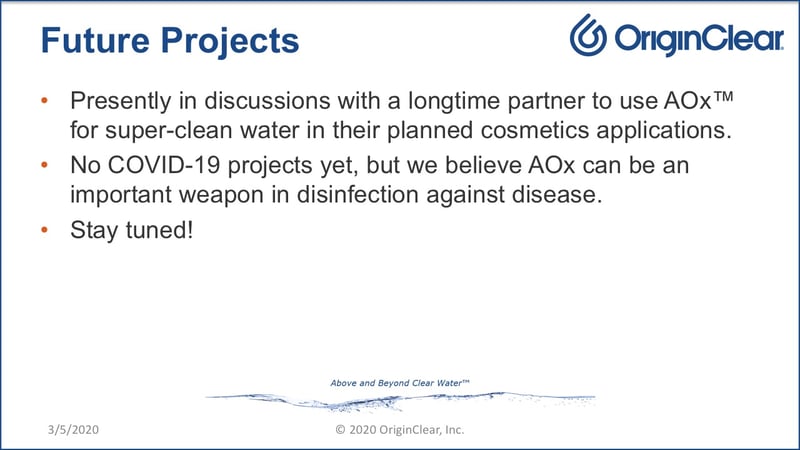
Future Projects
In this case, they only do it enough to water the grass at this auto-dealership in Pennsylvania, but they could go to potable if they wanted to. Then we have future projects, or discussions with a partner we like very much, who has brought us, in fact, about a million dollars worth of business over the last four years. Very helpful partner. I'm talking about a different one. I will talk about the other one shortly , but the long time partner we're talking about here is one who helped us out in 2018 with some financing. They make a lot of money selling health products, let's put it that way. They're very busy online, and they are putting together a cosmetics line. They want to use our water, super cleaned with the hydroxyl, and use that as a differentiation for the cosmetics.
Tom: Yeah, but they're really cool though. When we talked about it internally, because obviously anything with cosmetics, you're putting it on your face, right? A long time ago I had to do some business here, and as you know cosmetics have to be food ingredient level clean. You have to theoretically be able to eat it, which is an interesting topic for cosmetics and pharmaceutical companies as well. So to be able to be involved in that super clean water project, it's really interesting actually. It's a really cool angle on things that we do.
Riggs: So these friends of ours are very enthusiastic about using AOx to take water that's already clean, and then really, really, really get it super clean to a point where there would just not be any possible organics in the water at all, which is, as you say, really important for cosmetics. And you just made me realize that the body lotion we have, I could survive on that during the epidemic, if necessary.
Tom: You're going to eat that if you get Coronavirus?
Riggs: There we are in quarantine, it's like okay. “You got the shea butter?” Anyway.
Tom: That's good to know.
Riggs: We don't have the COVID-19 project specifically, I have to disclaim that, but we think that it is an important weapon, and is going to rise, so please stay tuned.
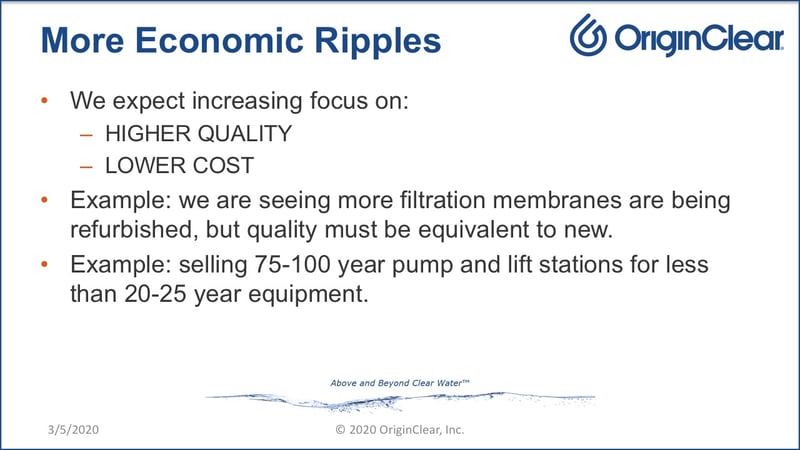
Focus On Higher Quality & Lower Cost
Expect increasing focus on higher quality and lower cost. I've been saying this now, these are economic ripples coming out of it. Anytime you have a slowdown, you have a move to quality, and a move to more efficiency, it's just how it is. It is actually a time when things get better. If you think about an economic slowdown, recession, whatever, for example as you recall in the year 2000 crash, Tom, it was all the crappy start-ups just went away, and we were left with the stuff that was worth something, like Amazon.
After 2000, for example, I managed to help get Yellowpages.com sold. It survived the year 2000 because it was a decent set up. Of course they had to tighten their belts, and figure out how to make things work better, but in the end, they had a big win. Sold for I think about $35 million, which wasn't bad for what they were.
“Now we're seeing more filtration membranes being refurbished, but the quality must be equivalent to new.” This was the partner I was telling you about who operates a membrane servicing business. He's finding that more and more of his customers are willing to go for refurbished to save money. They have two alternatives. One they can keep doing new but just stretch the life, right? Just use them too long. The problem with that is it damages the membrane, and it makes that membrane pretty much trash over time. It is kind of like a lung, so the cells start crunching down, and then it can't be rescued, and so then you can't give them back the core, the core's worthless. The smart thing to do is to observe proper schedules, and just go for refurbish, which can be as good as new. This partner is seeing that happen, and we're going to be working with him, and he's going to be advising us, well he already is. As I was saying, he's brought us about a million dollars of business in the last four years.
Pump & Lift Stations
Here's the other example which we're going to get into, and we're going to talk about Tom, selling pump and lift stations, that in our case can last 75 to 100 years for less price than equipment that will last 20 to 25 years. What is that all about, huh?
Tom: Pump, pump, pump it up.
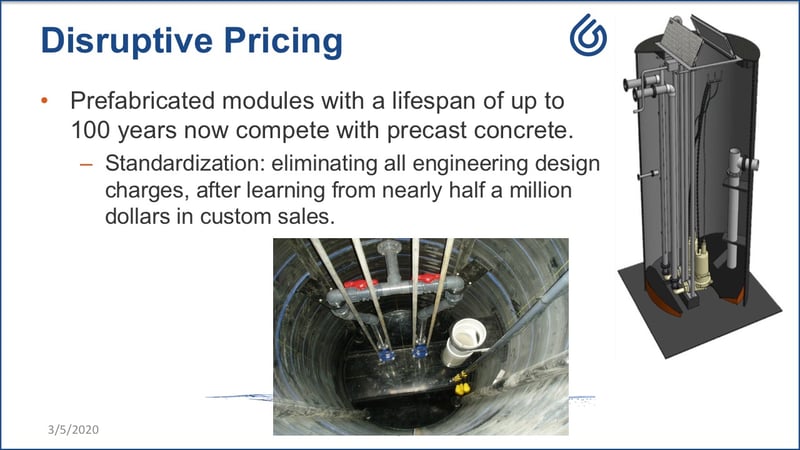
Disruptive Pricing
Riggs: Disruptive pricing. Today we announced that we have been able to break the price barrier on these prefab modules, even though they had a lifespan of up to 100 years, they compete with pre-cast concrete, which was cheap but not cheap enough, apparently, because in 100 years, you'll be buying four of them. Now you say, well I'm not going to live 100 years, yeah but cities do, and they're aware not all of these units come up for repair at the same time, and it's kind of like having incandescent light bulb versus an LED.
At one point, you just get an LED. You don't have to keep taking the ladder up to the ceiling and change that incandescent, because now it's a long-life LED. How do we do it? We eliminated all engineering design charges. Tom really was in charge of the learning process. We sold about half a million dollars in custom sales, and then we found that a very large budget for the custom engineering was just redlined out. What is it doing for you and Michael on the sales side?
Tom: Well what it does is it opens the market up, obviously, because we can complete now on price, as well as our quality, which is great. Because they always say if you want to go to the five Ps of marketing, it's product and price and promotion, right? I get all three now, which is super cool. So, I have a great product, obviously, I'm better than concrete. There's no doubt about it. When you deal with concrete, which is going to deteriorate and get corroded versus our SRTP (Structurally Reinforced ThermoPlastics) plastics, which is going to last much, much longer and be much more rugged, there's no comparison between the quality of the product.
We're definitely higher, but if we came in too high in price versus concrete, the good old boys still want to buy the way they used to do. Now with our better pricing, we have a parity situation on equipment to equipment. So now there's not that issue anymore and theoretically, if we continue to roll them out, we could even be coming in a little bit less than those concrete bunkers, because when you think about the install cost, ours is going to roll on a truck ready to go and drop straight into a hole. They're going to still have to pour some concrete and place, and put footings, and do all this wonderful stuff over there. It's still going to cost them more money than ours to put in place.
Of course Mike and I like to promote, as you do too obviously, and I think we're going to be able to promote a lot better, because we're going to be very clear about what we do, very clear about our price, and we're going to be like, “Hey, this is an obvious choice.” Then hopefully you'll get into it, but it's not just us saying we're great, it's also the cities, as you notice, saying, “We need to make a change,” because they're really recognizing that the concrete methodology of doing these pump and lift stations is failing, and they are spending a lot of money.
Now they are even getting mandates that are coming saying, “You really have to find an alternative.” You can't just keep doing the same old thing for 20, 30, 40 years, and getting the same breakage. They are tired of the breakage, because that breakage costs them a lot of money. It is not just the equipment, it's also digging up the ground. It is ridiculously expensive to do it the way they're doing it right now, and we're coming in here with just a much better way of doing this.
Riggs: So the price itself is lower, shorter install times with less, two days or three days instead of two weeks, which is a big cost advantage, and then of course there is the lifecycle value which is that literally it is, when you spread out over 100 years, it's one quarter the price of these pre-cast concrete modules. In fact, as I was saying last week, a city in the Mid-Atlantic area actually said, “That's it, we're mandating heavy duty plastic enclosures for our pump stations,” and they pointed to OriginClear as the prime example. Of course, consultants do what cities say, so they ran off and called us up, and we are working with them. So, this is a really good thing.
Now by the way, we have 69 participants, and that's double what we had at the beginning, so I'm going to recap a little bit in a bit.
Tom: And also an active chat, which I do see some people asking questions.
Riggs: Good point, very good point.
Tom: Which is in line, because they were asking do we make them ourselves, and the answer is yes, we make them ourselves. We manufacture them down in Texas. Obviously, we get different plastics from different suppliers, and then we do the actual work to put it all together to do the fittings, put the pumps inside, test them out. We deliver on site, we actually do the installs, so yes, it is our product and our product line.
Intellectual Property
We also have the IP with the patents and so forth, that is our proprietary technology.
Riggs: Intellectual property, we have five patents, indeed. Licensed from Mr. Dan Early. So, thank you, because I don't actually, on the screen share, I don't actually see the chat, so if you see them, pipe up. You'll be my monitor.
Tom: I will be the chat monitor, no problem.
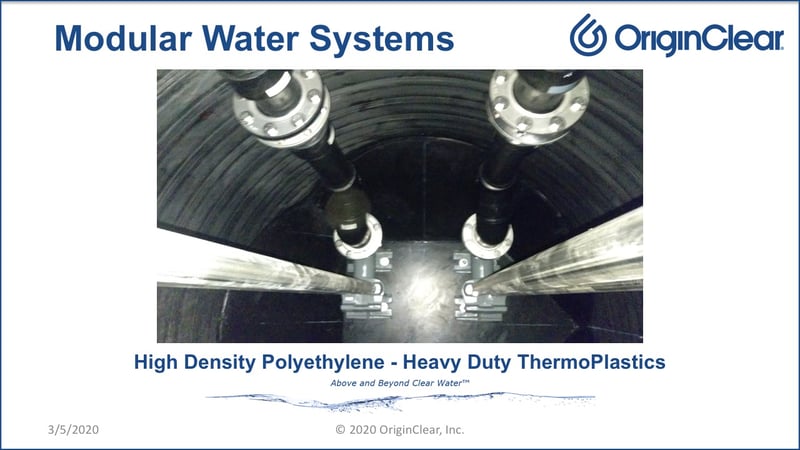
Riggs: Okay, so at the bottom of the screen which you see here we are looking down into a pump station. Now what is the difference between a pump station and a lift station? Very simple, lift equals waste. When it is lift station, you're lifting waste water. When it's a pump station, you are pumping fresh water up a gradient, typically. In this case, and they can be wet wells or dry wells, it depends on the application. Right here we don't know if this is going to be a wet well or dry well yet, it's [pumps and slide rails] just been installed, but you see the heavy duty plastic.
It has got a honeycomb surface in between. It is really a pipeline material used for oil and water pipelines and we cut segments in it. High density polyethylene is what it is, but it has got a sandwich construction. You've got water bottles made of high density polyethylene, but this is two layers of that with the honeycomb in between, or corrugation. Then at the bottom, what you have is a pump. It is very simple. On the top right you can see, it is simply a shaft and a well with a pump.
It's the simplest thing possible, and in fact there are hundreds of thousands of them in each city, huge number of them. The failure to maintain these is leading to as much as 32% net revenue loss, meaning a third of every dollar that the utilities could make is being lost. So, it is important for these wells to continue to operate. Now yes, we work a lot with businesses at the edge, but it so happens that this business is intensively municipal, and in this case, they are finding that they just have to spend the money. We believe that we are going to get very strong market share by having this combination of ridiculously better product, as well as a 75 to 100 year, we think longer, rating on the material.
For those who have joined us, we have been talking about what is called COVID-19, the Coronavirus, the new Coronavirus, as it's called, and its effects on the stock market, which is actually really responding better than I thought it would. Also the trends that are accelerating.
So, there was already a trend towards online movies, eating in, all these things, all these online Zoom webinars. These are intensified, and for us, what is being intensified are two things: Number one is more and more stuff happening at the edge, with businesses doing their own water treatment, but also a move toward quality, and lower cost, combination of. So, that is what we've been discussing so far. I might add that there is also a move towards, I think we are going to see a lot more happening in product development, the development of technical products having to do with dealing with the fecal matrix that propagates, basically poop is the method by which the virus travels.
What it is about is more economic ripples. If we go back a little bit, there is the fecal issue where we have the fact that it's kind of like how Lyme disease is transmitted through a mouse, then a deer, then a this then a that, different hop. This is what's called shedding, right? And so it's being shed.
Tom: It would help if you explain shedding. Remember that lovely graphic I gave you the other day?
Riggs: Yes, I do.
Tom: Do you have it by chance?
Riggs: I have it, but this train would slow down, so go head.
Tom: I want to make it easy for the audience, so it's like super simple to understand. So as sad as this might sound, when all of us have to do our duty every day, whether you are using the restroom or so forth, in China the reason why it kind of caught on so hard in Wuhan, I think that's how they pronounce it, right? They actually also looked back at the SARS virus that kind of outbroke years back in 2009, and they had correlations between the two.
So it's not just about airborne, when somebody's sneezing going pfft, and gets into your lungs. They are also saying how do you get a piece of bacteria or virus actually in your body? So they are saying you can touch a surface, whether the surface of a counter, or the surface of a toilet seat, and you can get it on your hand, and right in your mouth. Or unfortunately you can take it and touch food. So, if you are in food preparation, you can put it on food, and then you could spread it to all the people that touch the food. The other way it was getting around was they actually found that in China they have open toilets. True, it's like latrines.
Riggs: Turkish toilets.
Tom: Yes, Turkish toilets. Those Turkish toilets have no lids. They are basically just a long line of holes. So what is happening is the virus is creeping through.
Riggs: To be fair, it's not jumping through the air, but what is happening is people are grabbing onto the handles at the side. In order to pull themselves up, they are using the handles and the doors, and so forth, on the stalls. And it is problematic, shall we say, because perhaps there is not as much hand washing going on.
Tom: Here is where we get into it, because we are getting into the basics of the obvious. The obvious is this, very obvious don't touch that , it's contaminated. Then we're getting into what happens when it goes downstream, because we always deal with downstream, which is downstream water. Well guess what? If water's contaminated in point A, but it happens to roll downhill to point B, it is still contaminated, it's just now contaminated in two spots. Also the pipe that runs along between the two spots is also contaminated. If you pump it and send it to another place, you just push the contamination to another spot. So, now you are getting into the whole idea of, well if the water is “busted” and you moved it over to an irrigation system, sprinkled on our crops or you push it through piping in a building, that was the article I sent you.
Riggs: Right, right.
Tom: We'll get into that in a minute. Or you get some other stuff, say a hospital, where there are people treating all the sick people, and they are throwing away cotton swabs, and throwing away bathroom stuff and blood, and all of that is contaminated. That is now going into the system in the building. Well guess what, all that contamination is still hanging out in there.
So water treatment comes in because now we step in at one of those points, hopefully closest to the contamination point, not so far down the line, and put a treatment piece in there. Treatment can be either chemical treatment, or you can go with UV disinfection treatment, other things that we would be able to do, but you've got to be able to treat it. Chlorine, for example, treats it or bleach, same kind of concept. So this gets into where does water treatment equipment actually help reduce the theoretical contamination of water that's now waste water.
Really, I think that it’s trying to tie those together, because we can talk about the scariness of Coronavirus, but we should also talk about how our industry deals with these things all the time, because they have been dealing with it for a long time. They've been dealing with flu and SARS, even Ebola. There is even a whole thing about how not to give Ebola to people in Africa, basically, by treating the septic systems.
Riggs: You know we are not going to get in too deeply, because I have a wonderful rest of the presentation, but you are talking about, for example, this issue with the pipes. This all says that you need to treat - disinfect the water at the point of use. It is much safer to not just send it along down through tanks, reservoirs, pipes and so forth, because as you pointed out today, the pipes themselves are a source of propagation, if that makes sense.
Tom: Remember they quarantined an entire building, 25 story building, because a guy on floor number two, and a guy on floor number eight both got it, and they were like, “Hey, how do you both get it? You are in the same building but you're way far apart.” It's because it was cruising through the pipes of the building. Think about that.
Riggs: I guess these days we have to. The bottom line is that we have expertise in the area. Our Advanced Oxidation delivers a disinfecting solution based on the hydroxyl radical, which is very powerful. We have various projects working for example, super clean water, and cosmetics and so forth. They are focused on higher quality and lower cost - talking about the pump stations.
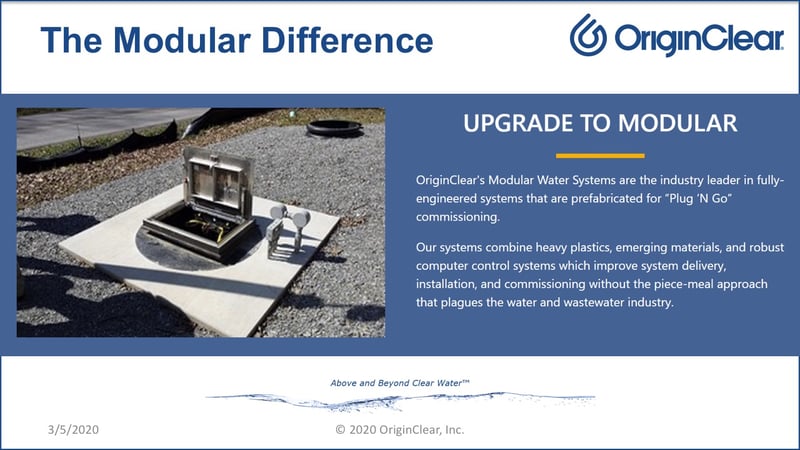
The Modular Difference
So just to wrap that up, here is what a pump station looks like when we bury it in the ground. You don't even see it. We are the industry leader in these fully engineered systems. They are prefabricated, and again, heavy plastics, and what is key here is [they are] robust computer controlled systems.
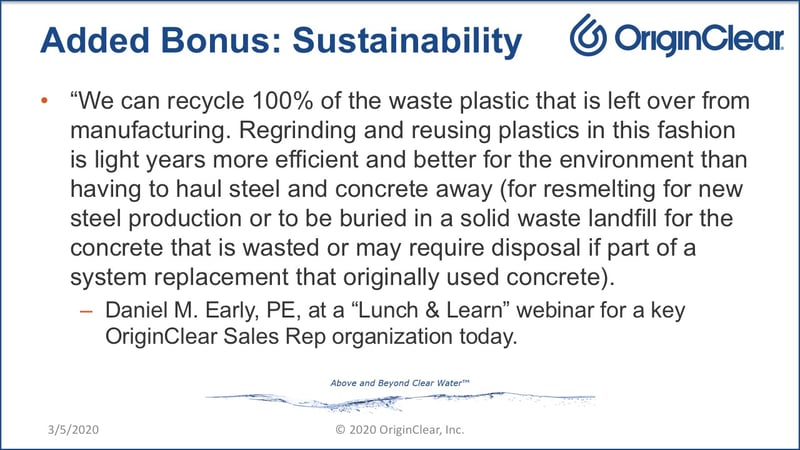
Sustainability
Now here's another cool thing, today are own Dan Early was doing a lunch and learn at a large sales rep organization that gives us a lot of business, and he was talking about these pump stations. First of all, all the residue from manufacturing is 100% recyclable. Eventually 100 years later, when you get rid of that pump station, it is 100% recyclable, and it's very easy to do as opposed to steel and forget about concrete. Try to recycle concrete, it is basically worthless. You can put it in the ocean to stop wave erosion, but that's about it. So that is a really big, cool thing about it.
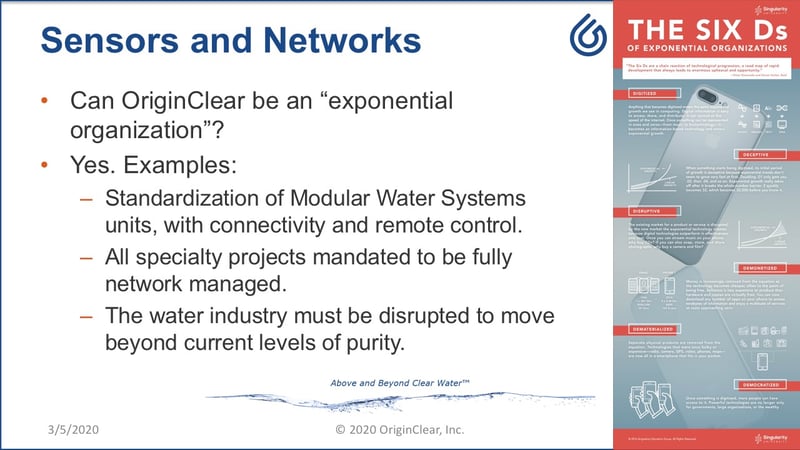
Exponential Organizations
All right, so then we have, I wanted to talk a little bit about this cool topic of exponential organizations. What the heck is an exponential organization? Well you've seen it, and on the right we have the six Ds of exponential organizations. You can find this on the Singularity University website. Basically, it is a chain reaction of technological progression, a road map of rapid development that always leads to enormous upheaval and opportunity.
Digitization
So we start out by digitizing things, and then you get into what is called a deceptive growth, which doesn't look so fast, but it is going to be exponential. Like what we were seeing in 70s, 80s where technology was slowly starting to coalesce, but this started to explode in the 90s. Then disruptive, where the existing market is disrupted by this new stuff, through exponential technology growth.
Demonetization & Dematerialization
Then we have demonetization, and that is where less and less money is being spent on things, because it's more and more virtual, and there is where we get into the dematerialized, removing physical products, and finally democratize, where everybody gets it. How can we be an exponential organization?
Democratized Water Treatment
Obviously, we want to get all the way down to where water treatment is democratized. It becomes what everybody is doing. As I always say and you've heard me say this before Tom, in California, we won't see the high-speed bullet train, we will see the Google self-driving car. Why, because we already have freeways, and it's the democratized solution. People already have cars, et cetera.
Tom: That train though, it would have been helpful a lot, especially when I used to go back and forth from San Diego to L.A. It would have been great.
Riggs: Sit there and read or write or work, yeah.
Abundance
Tom: Remember I used to take the train up all the time to our L.A. office. It was great, I would just take the little business train and get off all the time. I loved it, it was fantastic. As a matter of fact, I pulled this book off my shelf. It's called Abundance, it is Peter Diamandis' book. The guy who created the organization we were just talking about, as a matter of fact. And it talks all about everything you were just talking about. It is all about the future is better than you think. Actually, I kind of like that, because that is always what you're talking about. You are talking about the future.
Every time we are talking about the things we're doing, the concept of our Modular Water Systems™ is about doing things better in the future. And if you believe in the idea of abundance, you believe in the idea that you could democratize the things you talked about, you get to grow in scale, because your thinking is right. You're thinking about, “Oh, I don't need to wait around for the municipality and big government to tell me what to do,” because you as a business owner can take action now, and make something happen. I like that, it's cool.
Riggs: So Peter Diamandis, as you said, is the guy who put this together at Singularity University. Marvelous guy and he has got this concept of the exponential organization. Water today is not exponential, it's heavy systems, centralized, it is old school, it's like mainframes in the 50s. That all changed. Today we have mainframes, it's called the cloud. We know how to brand things sexy these days. Called the cloud, but we still have the profusion, so many of these PCs.
So you can still have central systems, but the load is taken off. The cloud today is not used for computing, it is used for storage, right? All the computing is happening at the edge, and so we want that similar thing to happen where the central processing of water is really all about providing fresh water, and then receiving treated water to send it along or whatever, but not to try and process it. That is not very efficient. Processing should be done at the edge.
Sensors & Networks
Well how do we become exponential? First of all, standardization of the Modular Water System, so that it is all boxed standard, Water System In A Box™. Secondly, they have connectivity and remote controls, so they can be managed from remote. Guy shows up at your location, “Why are you here?” “Your pump is down.” “Really, didn't even know it.” Boom, changes the pump. Why? There was connectivity, there was a Network Operating Center (NOC), and it depends on sensors. Then, specialty projects mandated to be fully network managed. Now, that is a very good example of what we will be doing. For example, if you are talking about maintaining somebody’s array, they've got 48 or 72 filtration membranes, they don't necessarily know which ones are 100%, or within tolerance, but we know, because we have sensors and we are remotely managing it, and we show up with the new or refurbished membrane, and the guy or gal didn't even know that.
Finally, the water industry must be disrupted to move beyond current levels of purity, and that is what our tagline that you came up with there, Above and Beyond Clear Water™. How do we move beyond current levels of purity? Municipalities do not provide the quality. They provide a basic quality, it is kind of like Medicare part A. But guess what, you need part B.
I just heard that there's going to be free Coronavirus care as part of part B. You get tested for free as part of part B, but not part A. So, part A is super basic, and this is why we all buy filters in our homes. Let's change that, so that we have clean water. It's not going to happen at the center, it's going to happen at the edge.
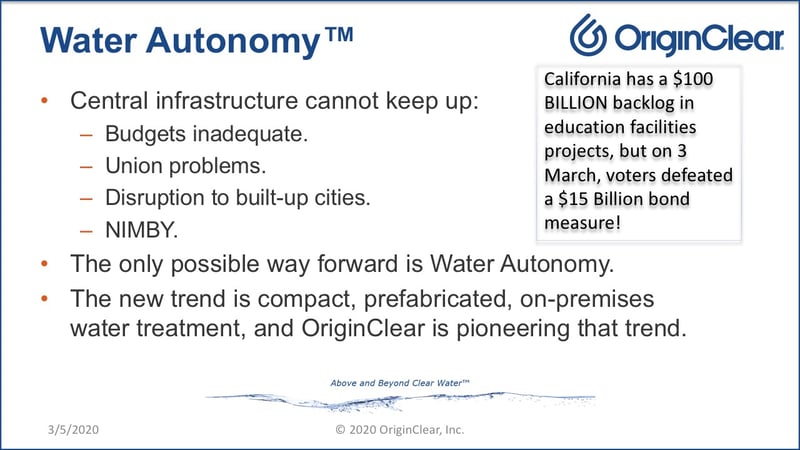
Water Autonomy
Okay, moving on here, “Central infrastructure cannot keep up,” and I had an example that just happened on Tuesday. Despite $100 billion backlog in building projects for education, on the third of March, Tuesday, voters defeated here a $15 billion bond measure. So, guess what? California schools, universities, et cetera, are not going to be maintained properly. Budgets are inadequate.
You have union problems, for example, down in San Diego, there's a big fight going on. It is a big disruption. You have got built up cities. Now you're going to tear everything up to run lines. And finally, not in my backyard (NIMBY). Just imagine people agreeing to have a sewage plant in their neighborhood, I don't think so. The only possible was forward is water autonomy, which is our word for users doing their own. We make that possible with compact, pre-fabricated, on-premises water treatment, and that is where we are definitely pioneers.
How Can You Participate
Okay, just a little while ago I was asked on the Q&A, “How can I invest?” And Corey, we're going to tell you about that. My answer was, first of all, are you an accredited investor? Because currently to get an investment with us, you have to be accredited. What does that mean? Well it means that you are making $200,000 a year, or with your spouse, your domestic partner, you are making $300,000, or you have a million dollar net worth, not including your home. It's not the one percent, but it's awfully close to it. The median for one percent is I think $440,000. So, you are in perhaps the top five percent of working Americans. We have an offer for you.
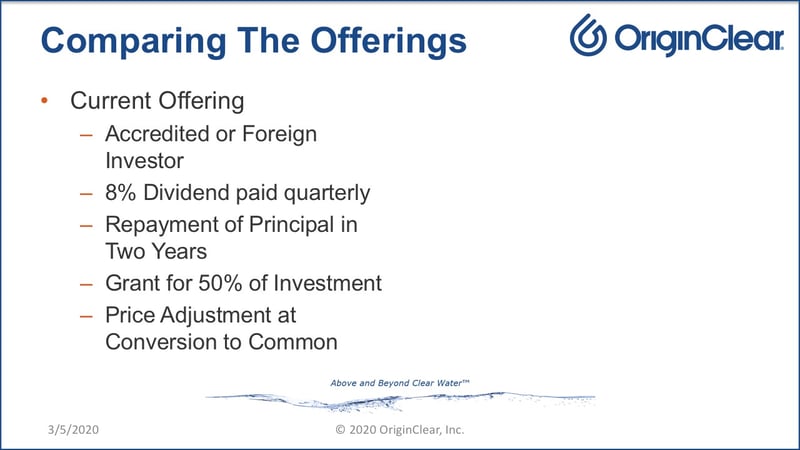
But we have an offer for everyone else, and I will tell you about it. Corey, I'm sorry, you said, “You're losing me.” So, very simple, if it is about an accreditation, if you are not accredited or a foreign investor, we don't want to sell you stock. We don't think that is a great idea. We are still in development, if stock gets diluted, you don't need that. You want stability.
In this new era of very conservative investment, you want to lend us money, essentially, secured by our revenue division. We will pay you a dividend, eight percent, and guess what? People are not going to be making anything in their savings accounts now that the fed reserve is going down to zero. And we will give you a stock grant for half the investment. So, if you invest $100,000, or 10,000 or whatever, out of 100,000, $50,000 worth of stock is given to you, and it is price adjusted, which means that it is protected against any price drop.
If you talk to Ken [Berenger] he will tell you this, be a lender not a speculator. You'll get to speculate, but not on your dime. In other words, you are getting paid back a full principle in two years. You're making eight percent along the way, and you're getting free stock that is also price protected. There is no offer that is more generous out there.
Why do we do it? Because frankly we are tired of going to Wall Street. Wall Street investors have only harmed the stock. If you want to know why that has happened over the years, it is very simple. It's Wall Street looking out for their best interests and not ours. We know that accredited investors are wonderful for us. We would rather pay you, simple as that.
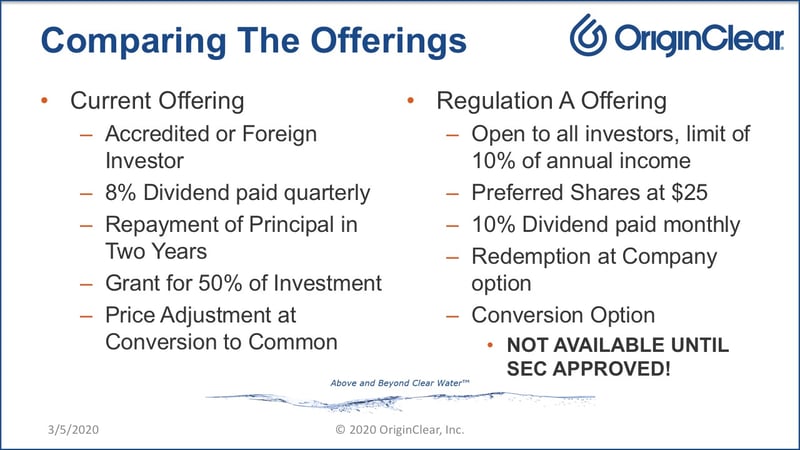
Okay, so then we have the other possibility. This is open to all investors. You do not have to be accredited. Just a limit of 10% of annual income. So, if you're making $40,000 a year, you can invest $4000. These things are priced at $25, that's because they're not shares that you can sell, and buy and sell on the market. That's just if you invest $1000, then you'll get 40 shares, basically. Those will pay you 10% dividend yearly, paid every month. So that's 10%. It's pretty good.
But here's the difference, redemption is at company option, whereas in the case of the accredited investors, it's a forced repayment in two years. Finally, there is a conversion option, you can, down the road, convert this to shares, but I want to warn you that we are not marketing this at this time. All I am telling you, is it has already been filed publicly. We hope it will be available soon. In the meantime, invest in the market, or hold on your to shekles and we will be there soon.
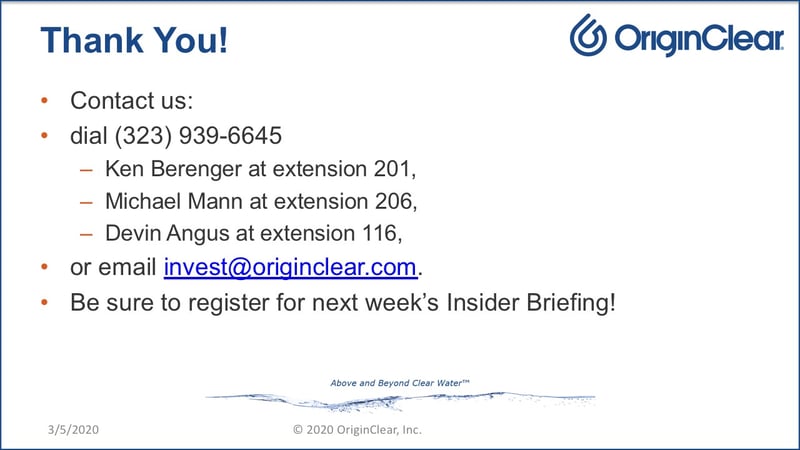
All right, to talk about this, about investing in Origin Clear, and get a piece of this water revolution that we've got going, and potentially what we will do in the area of helping human health with this horrible fecal connection with Coronavirus, if we get to that. Feel free to call Ken Berenger, at our central number 323 939 6645, extension 201. Michael Mann, the wonderful Michael Mann, 206. And Devin Angus at 116.
Why do I say Michael Mann's wonderful? Because he was the brilliant guy who said okay, let's cut the chord, get rid of the engineering services, and got us selling a standardized box standard product, which we are very grateful for.
You can always email invest@originclear.com. That will go to Devin Angus, and if you want to get to me, then definitely you can call him or email him. You can also reply to one of my newsletters, it's an easy way.
I hope that all the chats have been answered am I right, pretty much?
Tom: There's not too many other chats. If anybody has a question, throw it out right now, we're happy to bat a couple questions that you guys have. I'll read them off. And then obviously, Riggs if you wanted to revisit any particular topic that you're particularly excited about, obviously you can crush on Coronavirus and your thoughts there. You can go back in the stock market topic. I think you were actually onto something interesting earlier, where you were talking about how the markets do correct, obviously, and Coronavirus is a bit of a shock.
You actually were telling me a good story the other day where you were explaining how in macro-economic markets, where you have these very large multi-national companies, like the General Electrics who work in the water industry. Obviously, they are going to take an impact, because they have exposure to Asia, and they have exposure to other countries where the slowdown is going to impact them in a very serious way in their stock.
Small & Nimble
There are now 30 stocks, which there's only 30, are multi-nationals. However, because we are domestic, predominantly, and because we are small and nimble, we don't really have that same level of impact. You were talking about how a smaller company like us gets to run more efficiently in times, whether they are up or down, because we don't have that impact, like the multi-nationals who are always running by the quarter all the time, so to speak, so you should talk a little more about that, because I think it is relevant.
Riggs: Well I think you've covered it very well. I mean the fact is that we are in the wonderful position of not having billion dollar projects that might be put on hold. We are actually in the smallest, beautiful category of dealing with the business users at the edge, like that automotive dealership in Pennsylvania, or that trailer park in Alabama. These are the future users. These are the users that we will see take off in the marketplace, and we own them, so we don't have the burden of, “Oh my gosh, let's somehow keep it alive.”
Dependency On China
Good question from Vince Donovan to all panelists. "Are you dependent on China in any way?" No, we are not, and this is very, very interesting, because Tom, you've been leading a departure for us, phasing away from China and very smart my friend! Because we were not happy with our China operation for a variety of reasons, including the intellectual property protections.
Tom: We stabilized a lot sooner than we all noticed. Remember we were getting these really weird conversations, even from the guys who we work with over there, they just all of a sudden were not really dependable. China went through three hits in a row. Remember when all the people were leaving China because the government is cracking down on free trade? All these people are jumping over to Taiwan and Singapore, and they are trying to get out of there, because they're like, “Oh my gosh, I've had this great 10 year run, and it's coming down.”
Then America was going up, and China was not going up, and then Coronavirus hits. So you get three things in a row that were impacting China, and we are sitting here looking at it going, “Not the greatest market for us.” So, we were not really getting these great vibes out of China. But we were getting awesome relationships in Europe, and we are getting really good relationships in India, and even guys in Australia who are interested in us, but China wasn't really giving us a lot, were they?
Riggs: So the short answer is that we have actually ramped down our exposure already to China, even before this happened, and we announced this close relationship with Permionics in India. Well that was intended to take over servicing the entirety of South East Asia. Vince was asking "How many can you produce a month?" and correctly Tom said we do about five to seven per month.
But here's the thing, there are multiple plastic fabricators in America, all American, and what these guys are doing is building huge pipelines, thousand mile pipelines. We are taking tiny sections of those for these high density polyethylene reinforced units. So, we are not necessarily a big customer there. One time, years ago, I wanted to build a couple of beanbags. I called up the beanbag manufacturer, "Can I buy some beanbags?" They go, “Minimum order is 6000 tons.” Okay, I guess not. We are a small fry to the pipeline manufacturers, which is good because we're not going to overwhelm them. The point I'm making is it is very easy to ramp up the sales of these and the production.
Scaling Sales & Delivery
Tom: Yeah, it is actually really easy, because there's the two parts, like you brought up. Plastic, you can ramp up, I mean we could theoretically move a hundred units a month of just the plastic parts with no problem at all. We have plenty of capacity to go beyond that. The issue is more about where are we right now in our production line, and then where would we scale to, because we have to step our way through. We have an optimal way of doing it right now, but obviously, if you're selling more, we just put more men on the line, we run two shifts, we expand ops and continue to go. Getting to 20 then 30 then 50 units a month would be wonderful, but we don't yet do that. We have just got to move our way up the curve.
Riggs: Well Tom, that is your problem, isn't it? I mean basically I don't really care, you're just going to deal with it, it's your headache.
Tom: I'm sure I will hear more about it, they'll say, “Why haven't you sold that many this month?”
Riggs: That's funny. Vince was asking if the market wised and found out your product was what they needed, could you respond to that sales movement? Well, here is the way we would do it. You don't expand from a central point, what you do is you distribute it. This is what we learned in the technology world. We have partners that we can rely on who we know already. We talk about acquiring them, but along the way to acquiring somebody, you partner with them. We have already in fact qualified other manufacturers as backup fulfillment houses, to deal with precisely that problem.
You know the problem is not manufacturing, what takes all the time is talking to all the players. The consulting engineers, we talk to the city, the architects, and this thing, that and the other thing. Now we have shortened that loop by making it a standard product, but nonetheless, that's most of the trouble. Even assuming that we were swamped with business, which I think given our standardization and our pricing, we're going to see a lot of action, then we would be able to lay off the work to others, and of course becoming more prosperous, we'd be able to acquire them, so there we go.
So with that, I want to thank you all for sticking through it, it's been very interesting. Remember that every week I do more intimate [briefings], just me on the phone, shorter, and much more topical about what is happening this week and so forth. I'll be continuing to report what's happening with the new Coronavirus, what is happening with the market and how are we responding, taking advantage.
There are deals we are doing right now that I cannot talk about. You notice in these calls, we're not saying such and such a company and so forth, because we have not announced it. We say Permionics, because we announced them, but there's A B C D E company that we are doing deals with. We don't announce them. There is a deal that we will be talking about in the Middle East that has been done, but we can't say who it is, because it hasn't been announced. So, stay tuned. Do join me every week, and then next month we'll be seeing you. First Thursday of the month, which will be the second of April, will be the next one. It will be a great pleasure seeing you all. Thank you and thank you Tom for joining, it was a great pleasure.
Tom: You too, have a good night.
Register for next week’s LIVE Water Is The New Gold Monthly Webinar: HERE
SAFE HARBOR STATEMENT
Matters discussed in this presentation contain forward-looking statements. When used in this update, the words "anticipate," "believe," "estimate," "may," "intend," "expect" and similar expressions identify such forward-looking statements. Actual results, performance or achievements could differ materially from those contemplated, expressed or implied by the forward-looking statements contained herein. These forward-looking statements are based largely on the expectations of the Company and are subject to a number of risks and uncertainties. These include, but are not limited to, risks and uncertainties associated with our history of losses and our need to raise additional financing, the acceptance of our products and technology in the marketplace, our ability to demonstrate the commercial viability of our products and technology and our need to increase the size of our organization. Further information on the Company's risk factors is contained in the Company's quarterly and annual reports as filed with the Securities and Exchange Commission. The Company undertakes no obligation to revise or update publicly any forward-looking statements for any reason except as may be required under applicable law.
Important Disclaimer
The securities referred to in this advertisement may be sold only to accredited investors, which for natural persons, are investors who meet certain minimum annual income or net worth thresholds. These securities are being offered in reliance on an exemption from the registration requirements of the Securities Act and are not required to comply with specific disclosure requirements that apply to registration under the Securities Act. The Securities and Exchange Commission has not passed on the merits of or given its approval to the securities, the terms of the offering, or the accuracy or completeness of any offering materials. The securities are subject to legal restrictions on transfer and resale and investors should not assume that they will be able to resell their securities. Investing in securities involves risk, and investors should be able to bear the loss of their investment.
%20250px.png?width=250&height=53&name=OriginClear%20Logo%202019%20(RGB)%20250px.png)



